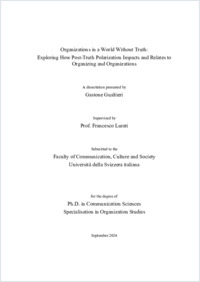Organizations in a world without truth : exploring how post-truth polarization impacts and relates to organizing and organizations
- Gualtieri, Gastone
- Lurati, Francesco (Degree supervisor)
- 2024
PhD: Università della Svizzera italiana
English
This dissertation explores how post-truth polarization impacts and relates to organizing and organizations at large. Our post-truth era is characterized by a confusing informational and communication landscape, where different communities embrace and build their views on alternative facts (Foroughi et al., 2019; Waisbord, 2018). This results in sharp polarization, as different collectives, not sharing the same vocabulary of assumptions, fail to engage in constructive dialogue, ending up mutually delegitimizing and dismissing each other (Knight and Tsoukas, 2019; Meyer and Vaara, 2020). This inter-group incommunicability of our post-truth polarized times is potentially problematic for organizations. Various streams of organizational scholarship indeed see different dimensions of the organization as dependent on meaningful communication. Organizing, organizations, and organizational life, in fact, depend on the constitutive nature of communication, as it is in and through communication that individuals and collectives co-construct common meanings that co-orient their actions, effectively making organization(s) possible (Schoeneborn et al., 2019; Koschmann, 2016; Cornelissen et al., 2015). In the post-truth environment, however, establishing common meanings, essential for the lives of organizations, is often impossible, leading to unforeseen implications for organizing and organizations at large. Therefore, in this thesis, I explore this matter to disentangle the relationship between communication, organization, and polarization. To accomplish this, I empirically focus on the introduction of 5G technologies in Italy. This case involves highly polarized organizations and social actors unable to communicate effectively over differences of opinion, making it an ideal context for investigating organizational and polarization dynamics. To gain focus, three articles have been developed, each exploring a narrower aspect of the overarching issue. The first paper investigates how today’s organizations polarize by analyzing the organizing of anti-5G activists on social media. This paper starts by acknowledging that social media-enhanced in-group communication both fosters organizing and polarization, and it explores how this heightened interaction could simultaneously constitute both. Findings show that social media did foster organizing by providing a space for one-sided interaction. However, the organizing dynamics unfolding within such unchallenged space transcended into radicalization and ideological segregation, effectively polarizing them. The second paper explores solutions to overcome the communication breakdown among collectives in our post-truth society. In fact, while establishing stakeholder relationships is key for corporate success, today’s polarization often makes it impossible because sides rely on alternative assumptions and facts. The paper thus proposes a framework based on narrative analysis that helps organizations understand stakeholders’ views, including assumptions and beliefs, objectives, expectations, and relationships. With this framework, I thus contribute to practice by providing a tool to enhance the stakeholder engagement process and to theory by fostering a systemic approach to stakeholder thinking. The third paper explores how post-truth polarization shapes the organizational approach to CSR. Indeed, the dominant approach to CSR, consisting of establishing an overarching stakeholder dialogue to influence their views, seems impossible in a landscape where polarized conversations occur separately. To address this puzzle, I studied how telecom companies approached CSR in circumstances where two groups of stakeholders were having separate conversations on their related CSR expectations. Findings show that companies engage in CSR with a partisan approach (i.e., by engaging with one side while ignoring and dismissing the other side). This sheds light on the changing nature of CSR communication in polarized environments, which can arguably exacerbate even more the polarization of different opinions. With these research efforts, my dissertation contributes to the literature by illustrating the existing relationship between communication, organization, and polarization. My research shows that polarization emerges as a side-effect of organization(s), as organizing dynamics and organizational actions may trigger polarizing effects when they unfold in contexts where communication is one-sided. This highlights that studying post-truth and specifically polarization from an organizational perspective is important for better understanding and addressing this societal challenge, as well as for highlighting further unforeseen dynamics of organizing and organization at large.
- Collections
- Language
-
- English
- Classification
- Information, communication and media sciences
- License
-
License undefined
- Open access status
- green
- Identifiers
-
- NDP-USI 2024COM005
- ARK ark:/12658/srd1329283
- URN urn:nbn:ch:rero-006-122327
- Persistent URL
- https://n2t.net/ark:/12658/srd1329283
Statistics
Document views: 305
File downloads:
- 2024COM005: 394
